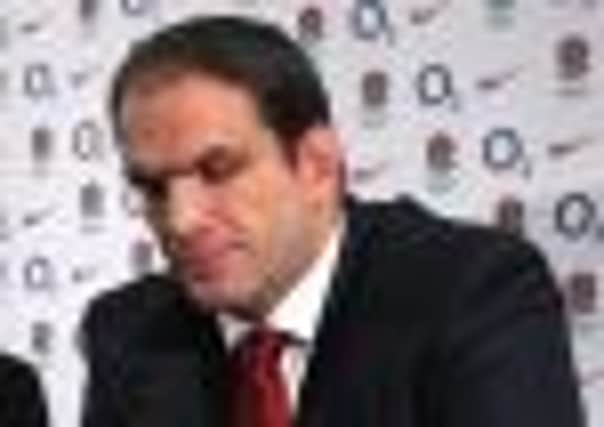Loose ends as Martin Johnson falls on his sword


Johnson does leave the Rugby Football Union harbouring a frustrating sense of “unfinished business” after England’s failed Rugby World Cup campaign.
But with no guarantees he would have been retained by elite rugby director Rob Andrew once the RFU’s review process was completed, Johnson the campaign had not helped, took the decision to bow out.
Advertisement
Hide AdAdvertisement
Hide AdEngland’s quarter-final exit from the World Cup was short of their minimum target and Johnson admitted the off-field scandals which dogged but England’s 2003 World Cup-winning captain refused to blame the players. He leaves the job with no excuses and proud of the legacy he will leave.
“I think there will be a part of me that regrets leaving the job in these circumstances, of course. There’s a bit of a feeling of unfinished business because you like to put right the things that need to be put right,” Johnson said. “It’s a tough job. I said when I came in I did it with my eyes open and I leave with my eyes open. It’s been my call and I understand that if I hadn’t made it somebody might have made it for me. This is not a knee-jerk decision, it’s a considered, thoughtful decision I have come to.
“You are always looking at if you are doing the right job or a good enough job. Do you want to continue it? It’s an all-encompassing and consuming job. The cycles are from World Cup to World Cup and you have to decide whether you are prepared to jump in for four years and wholly commit yourself to that job and weigh it up.
“I’m not. It is in the best interests of myself and England team right now. I’ve tried to take the whole picture into consideration and not just what happened in the tournament. At the World Cup we lost a game, we weren’t good enough. That will always be a disappointment.”
The highlights of Johnson’s 38-Test tenure would be England’s first Six Nations title since 2003 and the back-to-back victories over Australia in 2010. He was recruited by the RFU in 2008 to “instil a discipline and direction in the squad”, according to then-chairman Martyn Thomas who pushed through the appointment.
Mike Tindall, Chris Ashton, James Haskell and Manu Tuilagi were all disciplined for incidents during the World Cup which undermined Johnson’s leadership. Johnson chose to publicly defend Tindall following the now-infamous drunken night in Queenstown, even when his former team-mate apologised for misleading the England management. Johnson revealed for the first time yesterday that the incident did contribute to Tindall’s omission from the quarter-final against France. Tindall has since been fined £25,000 and dropped from the England squad following an RFU investigation, although he has indicated he will appeal that decision.
Haskell and Ashton were both hit with suspended £5000 fines for an incident at the team hotel in Dunedin and Tuilagi was fined £3000 for jumping from a ferry into Auckland harbour.
Johnson said: “I wasn’t let down (by the players). We were a team together,” Johnson said. “Obviously the off-the-field things during the World Cup didn’t help. We had a couple of isolated incidents early in the tour that were dealt with internally. Manu at the end didn’t help. It’s not about me and my sadness, any sadness is where the team is perceived at the moment.”
Advertisement
Hide AdAdvertisement
Hide AdJohnson’s decision to stand down comes on the eve of the Professional Game Board’s wide-ranging review of England’s campaign.
Much of the focus will be on Andrew’s role in the England structure. One source close to the PGB said: “Rob Andrew is ultimately in charge. If it’s not working then who’s responsibility is it? Where does it all come back to?”
Andrew remained defiant, refusing to stand down. The RFU must act fast to identify a replacement for Johnson, who was contracted until December. The Six Nations is looming in February and England are required to name an elite squad in the first week of January.
Johnson’s departure leaves the future of his coaching staff – Graham Rowntree, Mike Ford, Brian Smith and John Wells – in some jeopardy. Smith, the attack coach, is understood to have already been sounding out coaching roles in Australia but Ford and Rowntree are said to have support at Twickenham.
Johnson urged the RFU not to jettison its experience and know-how.
“There is a huge amount of experience there, there is a huge amount of knowledge and experience about what this game is about at this level, the very highest international level, the World Cup,” Johnson said.
“From my point of view, it would be a waste for that to be lost to the union. There are only so many people who have been through these jobs at this level and understand what it is all about.”